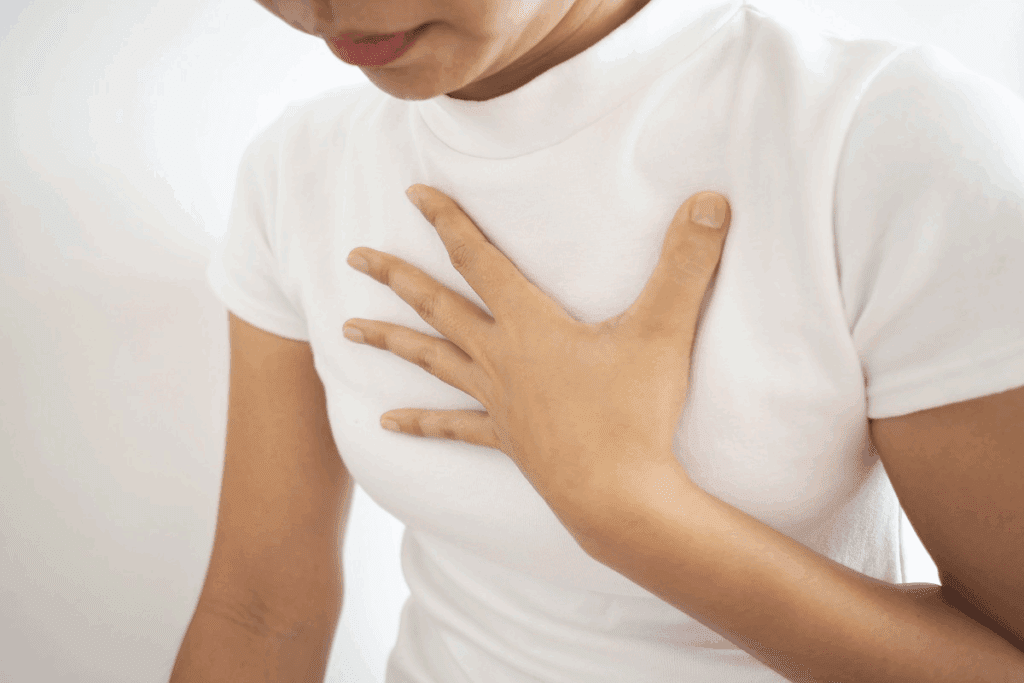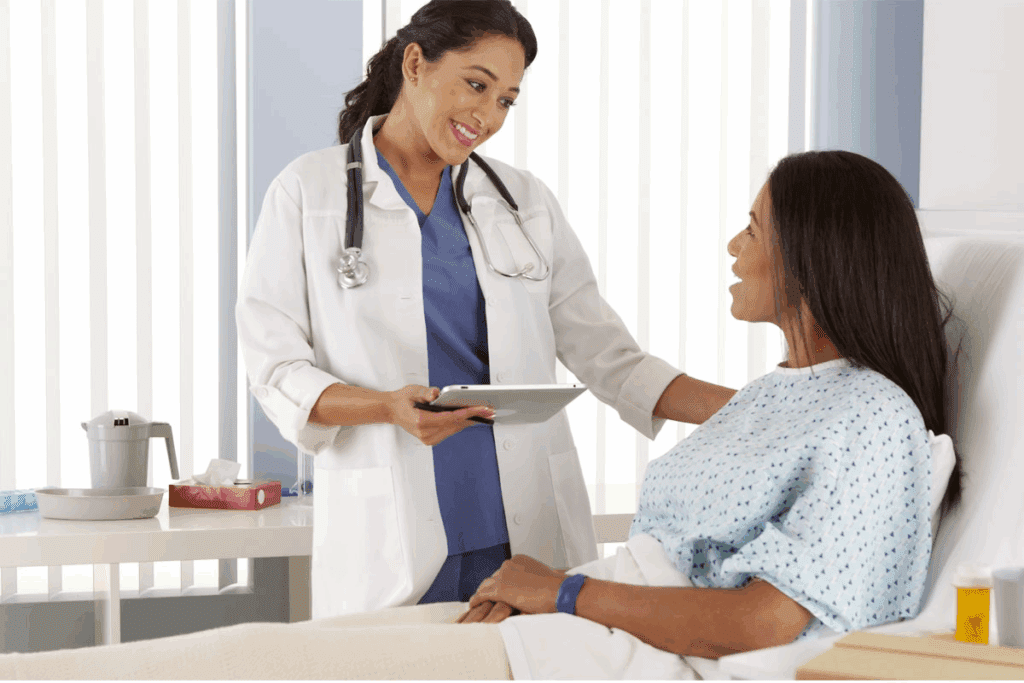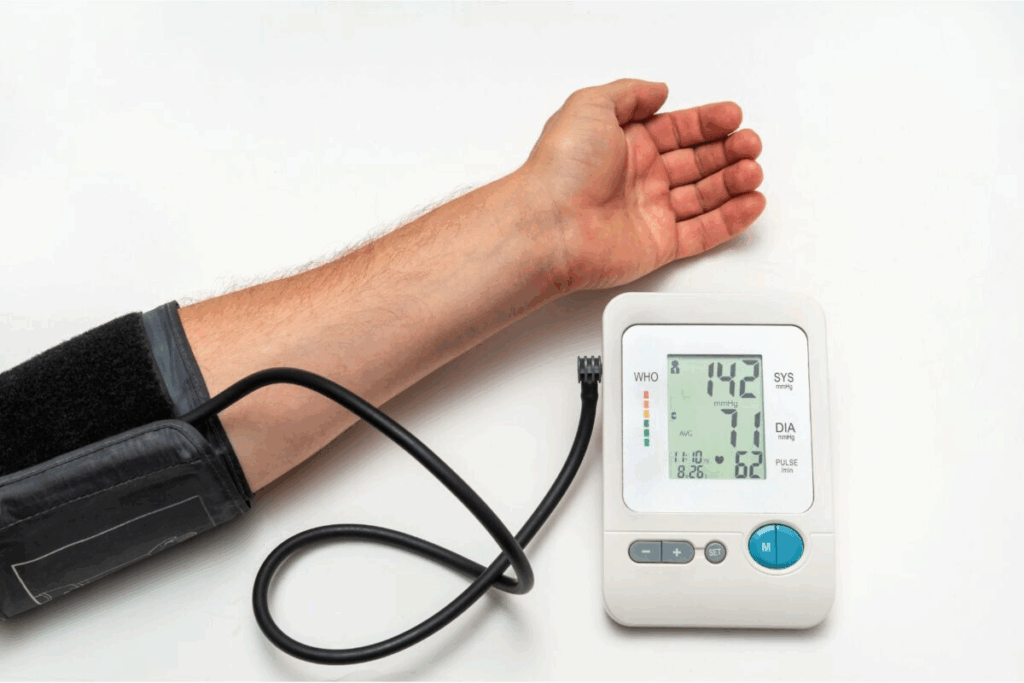
Sudden spikes in blood pressure, also known as sudden high blood pressure, can be triggered by various factors. At Liv Hospital, we understand the importance of identifying these causes to provide effective care.
Learn what can cause sudden high blood pressure and how to prevent it.
High blood pressure is often called the “silent killer.” It usually doesn’t show any signs or symptoms, according to the American Heart Association. Knowing the causes of sudden high blood pressure is key to managing and preventing these sudden increases.
At Liv Hospital, we are dedicated to international standards and the latest medical advancements. Our commitment is to provide world-class healthcare with complete support for international patients.

Blood pressure spikes can be scary, but understanding them is key to managing them. We’ll explore what a sudden increase in blood pressure means. We’ll also look at the difference between normal blood pressure and a hypertensive crisis. Plus, we’ll talk about how to spot a blood pressure spike.
A sudden increase in blood pressure is when your blood pressure goes up quickly. The World Health Organization says hypertension is when your systolic blood pressure is ≥140 mmHg or your diastolic blood pressure is ≥90 mmHg on both days. If your blood pressure goes above these levels suddenly, it’s a reason to worry.
To get this, let’s look at what blood pressure numbers mean. Blood pressure is shown as two numbers: systolic and diastolic. Systolic is when your heart beats, and diastolic is between beats.
It’s important to know the difference between normal blood pressure and a hypertensive crisis. Normal blood pressure is below 120/80 mmHg. A hypertensive crisis is when your blood pressure is over 180/120 mmHg. This is a serious situation that needs immediate medical help because it can cause heart attack, stroke, or kidney damage.
“Hypertension is a major risk factor for cardiovascular disease, and understanding its severity is critical for effective management.”
World Health Organization
| Blood Pressure Category | Systolic Blood Pressure (mmHg) | Diastolic Blood Pressure (mmHg) |
| Normal | Less than 120 | Less than 80 |
| Hypertension Stage 1 | 130-139 | 80-89 |
| Hypertension Stage 2 | 140 or higher | 90 or higher |
| Hypertensive Crisis | Higher than 180 | Higher than 120 |
To spot a blood pressure spike, know the symptoms and check your blood pressure often. Symptoms include headaches, dizziness, and shortness of breath. If you have these symptoms and high blood pressure, get medical help right away.
Checking your blood pressure regularly can catch spikes early. We suggest keeping a blood pressure log to track your readings over time.

Knowing why blood pressure suddenly goes up is key to handling and stopping hypertensive emergencies. High blood pressure can be caused by stress, anxiety, and some medicines. We’ll look at these causes, including both sudden and ongoing triggers, and when to worry about high blood pressure.
Acute triggers cause blood pressure to jump up right away, like stress or certain medicines. Chronic triggers, like bad diets or being overweight, can keep blood pressure high over time. The World Health Organization says unhealthy diets and being overweight are big risks for high blood pressure.
It’s important to know the difference between acute and chronic triggers. Acute stress might raise blood pressure briefly, but chronic stress can keep it high.
Many things can make blood pressure go up and down, like lifestyle choices and some health conditions. Modifiable risk factors include what we eat, how active we are, and our weight. Changing these can help avoid sudden blood pressure increases.
| Risk Factor | Description | Impact on Blood Pressure |
| Unhealthy Diet | High intake of sodium, saturated fats, and cholesterol | Increases blood pressure |
| Physical Inactivity | Lack of regular physical activity | Contributes to hypertension |
| Tobacco and Alcohol Consumption | Use of tobacco products and excessive alcohol intake | Can cause blood pressure spikes |
We need to know when high blood pressure is serious. Hypertensive emergencies need quick medical help. Be worried if blood pressure is very high and you have symptoms like chest pain or a bad headache.
Understanding sudden high blood pressure helps us take steps to avoid crises. Knowing the triggers and how to avoid them can lower the risk of serious blood pressure problems.
Stress and anxiety can make our blood pressure go up fast. This is our body’s way to defend us when we face threats or challenges.
The fight-or-flight response kicks in when we feel threatened. It was first explained by Walter Bradford Cannon. Our heart beats faster, blood pressure goes up, and we get ready to face or run from danger.
Emotional stress can really affect our blood pressure. Stress hormones like adrenaline and cortisol make our heart race and blood vessels narrow. This causes our blood pressure to go up.
Long-term stress can keep our blood pressure high. This is bad for our heart and can increase the risk of heart disease and stroke.
It’s key to manage stress to control blood pressure spikes. Meditation, deep breathing, and yoga can help lower stress. Also, regular exercise, a healthy diet, and enough sleep are important for keeping blood pressure in check.
| Stress Management Technique | Description | Impact on Blood Pressure |
| Meditation | Practice of mindfulness and relaxation | Reduces stress, lowers blood pressure |
| Deep Breathing Exercises | Slow, deliberate breathing to calm the body | Decreases heart rate, reduces blood pressure |
| Yoga | Combination of physical postures, breathing techniques, and meditation | Reduces stress, improves cardiovascular health |
By using these stress management methods every day, we can handle blood pressure spikes better. This helps our heart health a lot.
Our diet plays a big role in managing blood pressure. Some foods and substances can cause sudden increases. Knowing these can help prevent such spikes.
Caffeine is a stimulant that can raise blood pressure temporarily. It makes the heart work harder and narrows blood vessels. People sensitive to caffeine or with high blood pressure should watch their intake.
Tyramine is in aged, fermented, or spoiled foods. Eating foods with a lot of tyramine can suddenly raise blood pressure. This is risky for those on certain medications. Foods like aged cheeses and fermented soy products are examples.
Too much sodium is bad for blood pressure. Eating processed foods high in sodium can increase blood pressure. The American Heart Association suggests eating less than 2,300 milligrams of sodium daily. Ideally, it’s best to aim for 1,500 milligrams for most adults.
Knowing how these dietary factors affect blood pressure can help us make better food choices. This can lower the risk of sudden blood pressure spikes.
Some medications can suddenly raise your blood pressure. This includes both over-the-counter and prescription drugs. Knowing which ones can cause this is key to managing your blood pressure.
Decongestants help with nasal congestion from colds, allergies, or sinusitis. But, they can also raise your blood pressure. They work by narrowing blood vessels in the nose, which can also happen in other parts of the body.
A study found that decongestants can increase blood pressure by 5-10 mmHg. This is a big concern for people with high blood pressure.
“The use of decongestants can lead to significant increases in blood pressure, particularlly in individuals with hypertension.”
Medical Expert, Hypertension Specialist
NSAIDs are used for pain and inflammation. But, they can also affect your blood pressure. They can make your kidneys hold more fluid and narrow blood vessels.
| NSAID | Effect on Blood Pressure |
| Ibuprofen | Can cause fluid retention, potentially increasing blood pressure |
| Naproxen | May lead to increased blood pressure due to its effect on kidney function |
Other prescription drugs can also impact your blood pressure. This includes antidepressants, corticosteroids, and ADHD medications.
Examples of these medications include:
It’s important to check your blood pressure regularly if you’re taking these medications. Talk to your doctor about any concerns.
Substance use and blood pressure have a complex relationship. Many factors can cause blood pressure to spike suddenly. It’s important to know how substance use affects our heart health to manage high blood pressure.
Tobacco, like smoking, exposes us to harmful chemicals that can raise blood pressure. Nicotine, a key tobacco component, is a stimulant. It increases heart rate and blood pressure.
When nicotine enters the bloodstream, it narrows blood vessels. This can cause blood pressure to jump up quickly.
Tobacco use harms our heart health in many ways. It damages blood vessel linings, making them more likely to block. This increases the risk of heart disease.
Alcohol consumption also affects blood pressure. While some may not see a big change in blood pressure from moderate drinking, too much can raise it a lot. Alcohol can change the brain’s chemistry, affecting blood pressure.
Drinking too much can lead to high blood pressure that lasts. Cutting down on alcohol can help lower blood pressure for some. It’s key to watch how much alcohol we drink to avoid its effects on blood pressure.
Illegal drugs can have a big and unpredictable effect on blood pressure. Drugs like cocaine and amphetamines can raise blood pressure a lot because they stimulate the body. These substances can cause serious heart problems, like heart attacks and strokes, in people with heart issues.
Knowing the risks of substance use is key to avoiding sudden blood pressure spikes. Being aware of how tobacco, alcohol, and illegal drugs affect our heart health helps us make better choices for our health.
Sudden hypertension can be caused by many health issues. These issues affect how the body controls blood pressure. Knowing these conditions is key to managing and preventing sudden blood pressure spikes.
Kidney disease is a major cause of sudden hypertension. The kidneys help control blood pressure by managing fluid and electrolyte levels. When kidney function drops, blood pressure can rise.
Kidney disease can lead to high blood pressure in several ways. It can cause fluid buildup and activate the RAAS system. This system controls blood pressure and fluid balance, leading to vasoconstriction and fluid retention.
Hormonal imbalances, like those in the thyroid and adrenal glands, can also cause sudden hypertension. The thyroid gland controls metabolism, and problems with it can affect blood pressure.
Thyroid disorders, such as hyperthyroidism, can raise blood pressure due to increased metabolism and sensitivity to catecholamines. Adrenal gland disorders, like Cushing’s syndrome and pheochromocytoma, can also cause hypertension. This is because of too much cortisol and catecholamines.
Some heart conditions can directly cause sudden blood pressure increases. These include:
| Condition | Description | Effect on Blood Pressure |
| Aortic Coarctation | Narrowing of the aorta, the major artery that carries blood from the heart | Increased blood pressure due to obstruction of blood flow |
| Pheochromocytoma | A rare tumor of the adrenal gland that produces excess catecholamines | Sudden and severe increases in blood pressure |
Knowing these health conditions helps us understand sudden hypertension. It also helps in finding the right ways to manage it.
It’s important to know about white coat syndrome and labile hypertension for accurate blood pressure checks. These issues can change blood pressure readings, leading to wrong diagnoses or treatments.
White coat hypertension happens when blood pressure goes up in a doctor’s office. This is often because of stress or anxiety from being in a medical setting. It’s called “white coat” because doctors wear white coats.
Key characteristics of white coat hypertension include:
Labile hypertension means blood pressure changes a lot, without a clear reason. It can be caused by stress, some medicines, and health problems.
The main features of labile hypertension are:
Telling true hypertension from temporary spikes is key for good management. This means watching blood pressure closely in the doctor’s office and at home. It also means finding out what might make blood pressure go up or down.
Strategies for differentiation include:
By understanding and tackling white coat syndrome and labile hypertension, we can make blood pressure checks more accurate. This helps in managing hypertension better for everyone.
Knowing when to get medical help for sudden high blood pressure is key to avoiding serious health problems. High blood pressure, or hypertension, can cause severe health issues if not treated right. It’s important to know the signs that mean you need to see a doctor right away.
A hypertensive emergency happens when blood pressure is very high, over 180/120 mm Hg, and you have symptoms like severe headache, chest pain, shortness of breath, or confusion. If you or someone you know has these symptoms, get emergency medical care right away.
Some warning signs that need immediate attention include:
While tracking your blood pressure at home is important for managing hypertension, knowing when to go to the emergency room is also key. If your blood pressure is very high and you’re feeling symptoms, don’t wait to get help.
Tracking your blood pressure at home is helpful, but it shouldn’t replace what your doctor says. If you’re not sure about your readings or are feeling worried, talk to your healthcare provider.
Treatment for sudden high blood pressure depends on the cause and how severe it is. For hypertensive emergencies, quick medical treatment is needed to lower blood pressure and prevent damage to organs.
Treatment options might include:
It’s important to work with your healthcare provider to find the best treatment for your situation.
Managing sudden blood pressure increases needs a full plan. This plan includes lifestyle changes and knowing what can trigger it. By learning what causes sudden high blood pressure, people can act early to lower their risk.
Changing your lifestyle can make a big difference. Eating healthier, quitting smoking, and being more active can help control blood pressure. The World Health Organization says these actions can lower blood pressure and cut down heart disease risks.
At Liv Hospital, we help people on their path to better health. We offer detailed care and advice on managing blood pressure. This way, our patients can handle their health better and avoid sudden spikes in blood pressure.
To stop blood pressure spikes, pay attention to what you eat, manage stress, and know how some medicines and substances affect you. Taking these steps can greatly lower the chance of sudden high blood pressure.
A sudden increase in blood pressure is when it goes up a lot in a short time. It’s usually above 180/120 mmHg. This is called a hypertensive crisis.
High blood pressure can happen suddenly for many reasons. Stress and anxiety, too much caffeine and sodium, and some medicines can cause it. Also, health issues like kidney disease and hormonal problems can play a part.
Stress and anxiety make your blood pressure go up. This is because your body goes into fight-or-flight mode. Long-term stress can make your blood pressure stay high, raising your risk of hypertension.
Eating too much caffeine, foods with tyramine, and a lot of sodium can make your blood pressure jump. It’s good to watch what you eat to keep your blood pressure in check.
Yes, some medicines like decongestants, NSAIDs, and certain prescriptions can make your blood pressure go up quickly. Always talk to your doctor about any side effects your medicines might have.
Using tobacco, nicotine, drinking alcohol, and taking illegal drugs can all make your blood pressure go up. It’s best to avoid these to keep your blood pressure stable.
Kidney disease, hormonal imbalances, and heart conditions can cause sudden high blood pressure. It’s important to manage these conditions to control your blood pressure.
White coat syndrome is when your blood pressure goes up in a doctor’s office because of stress or anxiety. It doesn’t always mean you have true high blood pressure.
If your blood pressure is very high and you have symptoms like chest pain, shortness of breath, or a severe headache, get help right away. This is called a hypertensive emergency.
High blood pressure can happen suddenly for many reasons. Stress, what you eat, some medicines, and health conditions can all play a part. It’s a good idea to keep an eye on your blood pressure and talk to your doctor about it.
A sudden increase in blood pressure can be caused by stress, anxiety, caffeine, and some medicines. Knowing what can trigger it can help you manage your blood pressure better.
High blood pressure can come on suddenly for many reasons. Changes in your environment, stress, or health conditions can all contribute. It’s best to talk to your doctor to figure out why and how to manage it.
World Health Organization. (2025). 7 Causes of Sudden High Blood Pressure You. Retrieved from https://www.who.int/news-room/fact-sheets/detail/hypertension
Subscribe to our e-newsletter to stay informed about the latest innovations in the world of health and exclusive offers!
WhatsApp us